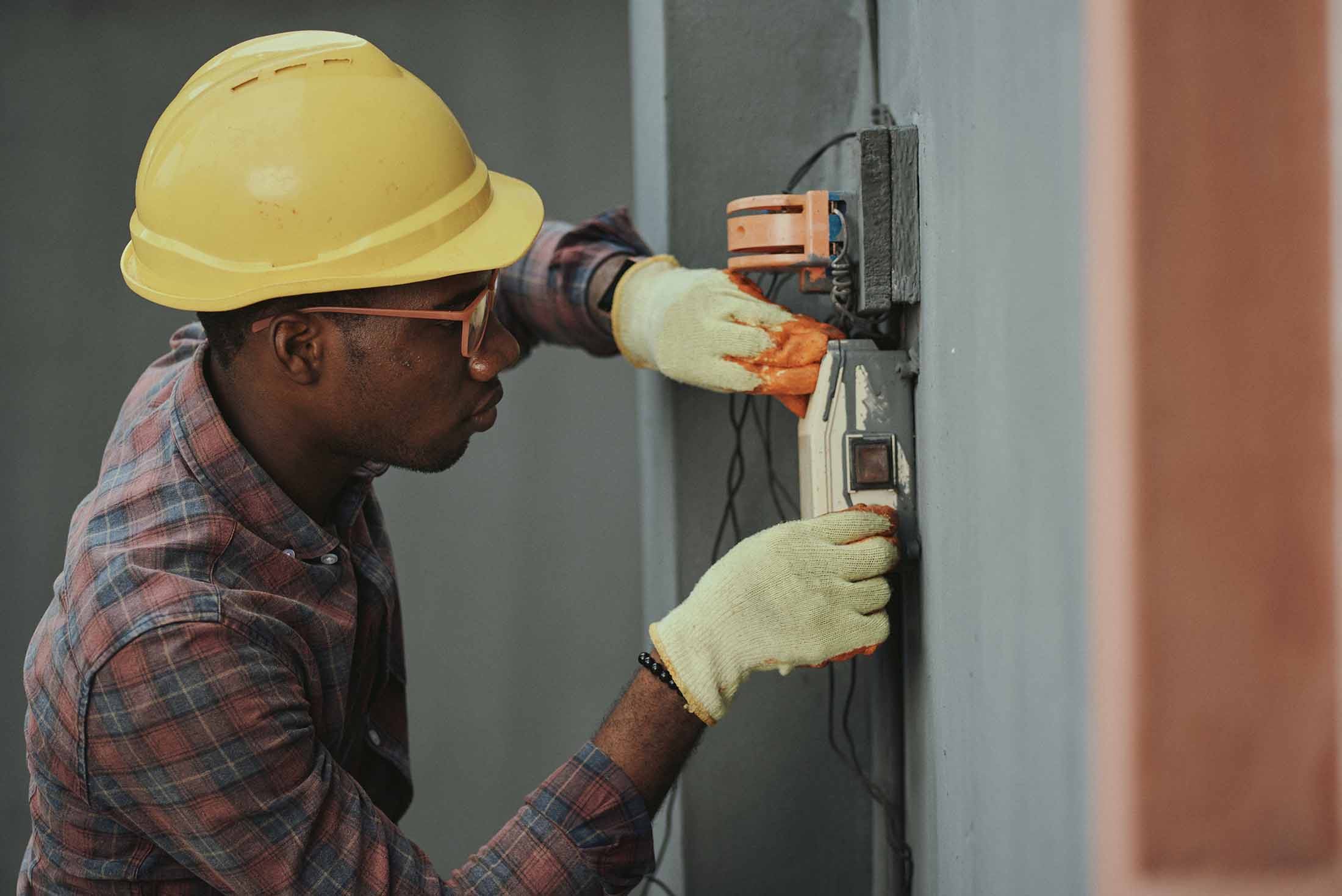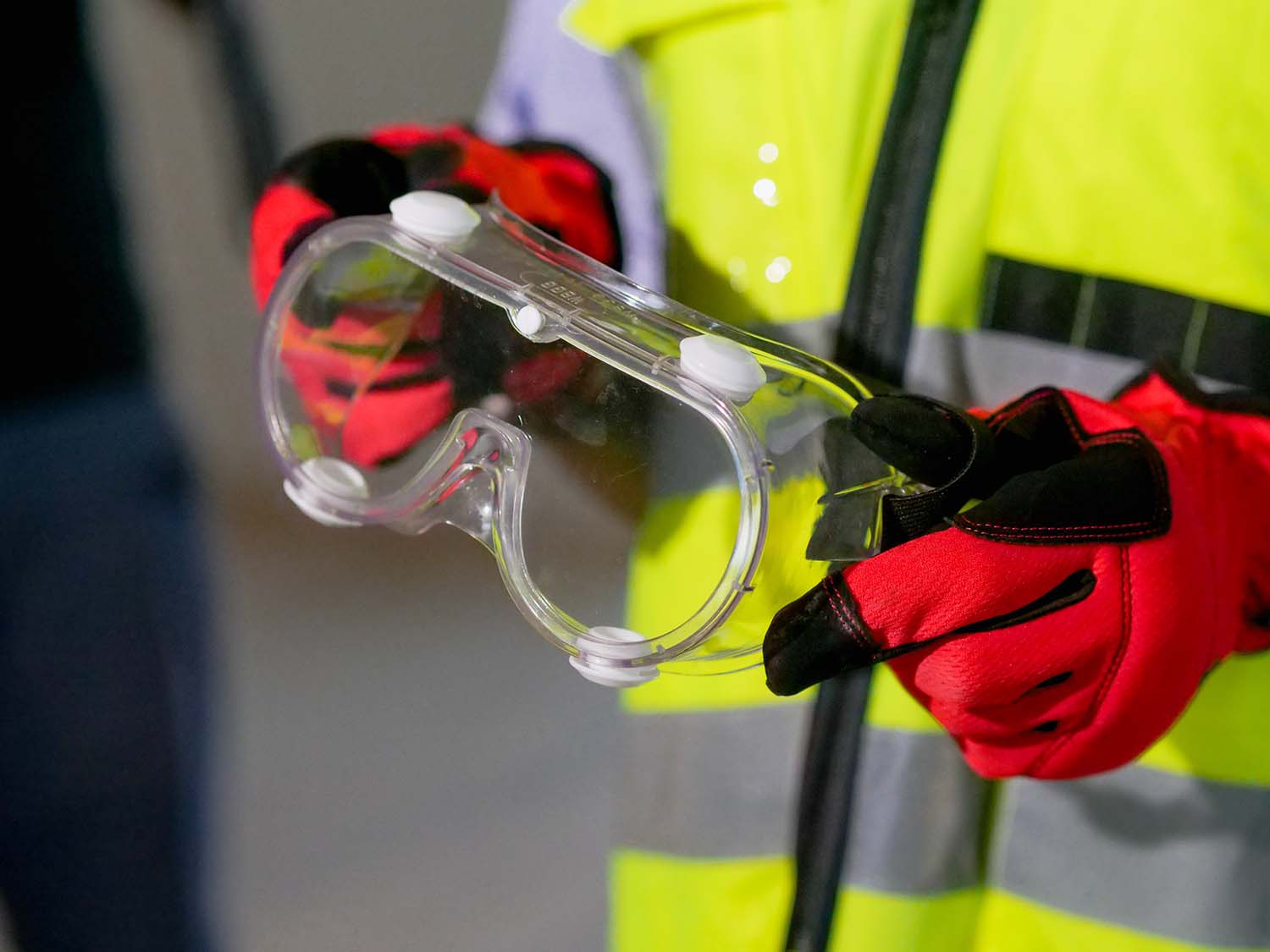The 20 Most Important Electrician Tools
8 min read

When the lights go out, all your customers care about is getting the electricity back on—fast.
Whether you’re working on power lines or in someone’s home, electrical work is dangerous and complex. The right tools will help you get the job done safely and efficiently.
In this guide, we’ll provide a thorough overview of the tools you’ll need, where you can find them, and how much you can expect to spend.
Jump to the section that most interests you:
20 Most Important Tools for Electricians
From basic tools like screwdrivers to electrical tools like voltage testers to software that helps you manage your employees and customers, here are the most important tools every electrician needs.
Hand tools & other basics
Basic tools like pliers and electric drills are essential elements in any toolbox, whether you’re an apprentice, journeyman, or master electrician. The following handheld devices enable you to work with precision on any task, from installing a ceiling fan to replacing an electrical panel.
Screwdrivers
Screwdrivers are a must-have for fastening or loosening different types of hardware. You’ll need a variety of types and sizes to make sure you always have the right tool for the job. You can find a good screwdriver set for $50-$100. You can also buy an adaptable multibit screwdriver with interchangeable Phillips and Flathead tips for $30 or so.
Drill
Every electrician needs a power drill—either a corded or low-voltage cordless drill—to make quick work of fastening and disassembling. If you’re working through concrete, you’ll also want to have a hammer drill on hand. A good drill will cost $100 or more.
Pliers
Pliers are multifunctional tools that can safely grip, cut, twist, bend, or straighten wire. They can also be used for crimping wire if you don’t have a pair of wire crimpers handy. Any professional electrician needs at least three types: side-cutting pliers, needle-nose pliers, and lineman’s pliers. They come in various sizes and price ranges, from $15 to more than $100.
Level
A level is a simple but essential item to keep in your tool belt or tool pouch. Keeping conduits straight and making sure light fixtures are plumb is next to impossible without this invaluable tool. You can buy a simple torpedo level for $5-$10 or a laser level starting around $30.
Regular tape & fish tampe
Fish tape (sometimes called draw tape) is made of steel or fiberglass to help you route wires through walls and tricky spaces that are difficult to access. You can buy a case of quality fish tape for less than $30.
Electrical tape is a must-have in any electrician’s toolkit. Made of plastic, vinyl, or cloth, electrical tape prevents the electrical current from passing to other wires and protects you from electrocution. A roll of electrical tape will run you about $5.
Tape measure
Electrical work requires a lot of measuring, so a tape measure is another must-have. Professional electricians should have on hand a 6-foot wooden rule for working in energized environments, as well as a traditional metal band tape measure. You could also spring for a laser measuring tool, which is highly accurate, can store multiple measurements, and even do calculations. A standard measuring tape will cost you between $10-$20. A laser measuring tool will cost anywhere from $25 to $125.

Flashlight
Working in dark spaces is part of an electrician’s job, so you should always have a heavy-duty flashlight handy. Even better, a headlamp is crucial when you’re crawling through an attic while trying to carry all of your tools and hold a flashlight in order to see where you’re going. Either option will run you about $20.
Where to buy these tools
You can purchase any of these basic tools on Amazon.com, at your local hardware store, or from big box stores like Wal-Mart or Target. Alternately, you can buy them from Home Depot or Lowe’s, which are large chains with thousands of locations and a wide selection of tools. Both stores offer credit cards for business owners so you can pay for your tools over time. They also allow you to take advantage of discounts and additional benefits like extended return periods.
Specialized tools
Whether you’re an independent contractor or run an electronics repair business, you need specialized tools for working with electrical wiring safely and effectively. Here is the equipment every electrician should have in their toolkit.
Terminal block
A terminal block (also called a connection terminal or terminal connector) is used to connect two or more wires together. The modular structures are a way to join wires in a more secure and organized way than simply using wire strippers and electrical tape. There are several different types of terminal blocks, from single-level pass-through to multi-level terminal blocks to power distribution blocks. A simple block costs $10 or less.
Wire strippers
Wire strippers are a critical tool for doing electrical work, used to strip insulation from wires without damaging them and creating a hazard. They’re used by professional electricians and do-it-yourselfers alike for things like replacing an electrical outlet or installing a light fixture. You can buy a high-quality pair of wire strippers for less than $30.
Conduit bender
When installing wiring, electricians often need to work around corners or other awkward spaces, which requires bending the conduit. A conduit bender enables technicians to curve the piping to accommodate the wire routing without damaging the conduit. A good hand-operated bender for creating 30-to 90-degree angles costs about $50.
Splicing connector
Splice connectors are plastic clips used to connect two or more pieces of wire without having to solder them. They can be used with telephone cables, electrical cables, and electrical device wires. You can buy a 10-pack of splicing connectors for about $5.
Reaming bit
Any electrician should make sure to have reaming bits for their drill (or, alternately, you could buy a multi-bit reaming screwdriver). A reaming bit allows you to widen an opening in one end of a pipe so you can connect it to another segment of piping to create a secure conduit. You can find one for around $20.
Where to buy these tools
Most of these specialty tools are available at Home Depot, Lowe’s, or your local hardware store, or you can check online to find a Greenlee or Klein tools distributor. You can also purchase them from online retailers such as Amazon, Grainger, Elliott Electric Supply, or Wholesale Contractor Supply.
Electrical tools
Electrician tools start to get more complex—and pricey—when you’re working on large-scale jobs or with energized equipment. These tools help you determine when and where it’s safe to work.
Circuit-breaker finder
Without a circuit-breaker finder, locating the right circuit breaker can be a two-person job, especially in larger homes. Circuit-breaker finders use two components—a receiver you can plug into outlets and a handheld digital transmitter—to identify which circuit breaker is connected to an outlet or fixture. At about $50, it’s a good tool for anyone doing electrical work to have.
Circuit analyzer
Circuit analyzers are handheld devices used for testing and identifying faults on a line that could lead to equipment malfunction or fire. Today’s circuit analyzers enable electrical contractors to troubleshoot under a full load without disrupting any connected equipment. At $250 or more, a circuit analyzer is an investment—and a worthwhile one.
Voltage tester
A voltage tester enables you to quickly verify power has been cut off to an outlet so it’s safe to work on. It works by inserting metal probes (that are usually wrapped in rubber or plastic) into an outlet. A good non-contact voltage tester will cost you $30-$40.
Multimeter
Also known as a volt/ohm meter (or VOM), a multimeter goes a step beyond a voltage tester to help you stay safe on the job. Digital multimeters can measure voltage, current, resistance, and more and can cost anywhere from $50-$100.
Where to buy these tools
Like the specialty tools mentioned above, most of these items are available at your local hardware store, Home Depot, Lowe’s, or online retailers like Grainger, Elliott Electric Supply, or Wholesale Contractor Supply. You can also find some good deals on electrical tools on eBay.
Protective equipment
Working with electricity is high-risk—in fact, electrical linework is one of the Top 25 Most Dangerous Jobs in the United States. That’s why personal protective equipment (PPE) is one of the most important tools of the trade. The safety equipment you use will depend on the specific work you’re doing as well as OSHA requirements, and here are a few must-haves.

Safety goggles
It’s important to protect your eyes when working with electrical wiring or operating one of the many power tools electricians use, so you should always have a pair of safety goggles in your toolkit. You can find a pair for $10 or less.
Gloves
Gloves are an essential safety tool for anyone doing electrical work. Rubber insulated gloves protect you from electrical shock, while leather gloves prevent cuts and burns. Electricians often wear them at the same time for extra protection (the leather gloves over the rubber). You can buy them for around $25 a pair.
Insulated matting
Insulated mats are rubber floor coverings used to protect electricians from shock. Rubber inhibits the flow of electricity and can also provide a stable, cushioned surface for technicians to stand on while working on switchgear, substations, or electrical workstations. A good mat costs about $100.
Rescue rods
Rescue rods (or hooks) are designed to pull injured workers away from a hazardous area. Emergency first-responders will use a rescue rod to remove a victim from the source of electricity without being electrocuted themselves. They can also be used to remove large items away from live wires safely. Rescue rods can cost as much as $500, but your life is priceless.
Where to buy this equipment
Safety equipment is typically sold anywhere electrical tools are for sale—Home Depot and Lowe’s, local hardware stores, and online retailers. This is one area where you don’t want to skimp: Spring for unused, high-quality equipment.
Software: Other Critical Tools in the Electrician’s Toolkit
In addition to the tools your technicians use in the field, electrician businesses rely on software to keep operations running smoothly. Field service software can automate manual processes and increase efficiency, which is especially important for small companies with limited resources.
Routing & scheduling software
Routing software is essential for field service companies like electrician businesses because it plans optimized routes to reduce travel times between jobs. This enables your techs to visit more customers in a day which means more profit!
Software like OptimoRoute automatically plans routes based on details you provide to the system about each job. Drivers can then take the most direct route between jobs, which reduces fuel costs and mileage on your vehicles. Plus, it frees up your dispatchers from technician scheduling duties so they can focus on providing excellent customer service.
Accounting & bookkeeping software
It’s easy to put accounting and invoicing on the back burner while you take care of your customers. But receiving customer payments on time is critical to keeping your business running.
Most field service software today is available as SaaS (software as a service), which means you access it through the internet on a subscription basis. With SaaS, you don’t have to install anything or worry about updates—the vendor handles it for you—and your data is stored in the cloud.
Be sure any software you consider offers a free trial so you can test it out before you commit. That way, you can choose a solution that has all the features you need (without having to pay for the bells and whistles you don’t need) and is easy to implement.
Increase Your Electrical Business’ Efficiency and Profitability With OptimoRoute
In addition to cutting down on travel time, OptimoRoute can automatically pair electricians with the right skill set to each jobsite and ensure they have the proper tools on hand so your team can complete more jobs, faster. To see how OptimoRoute can improve your electrical contracting business’ bottom line, try it free for 30 days!
Try OptimoRoute™ for Free
No installation or credit card required


